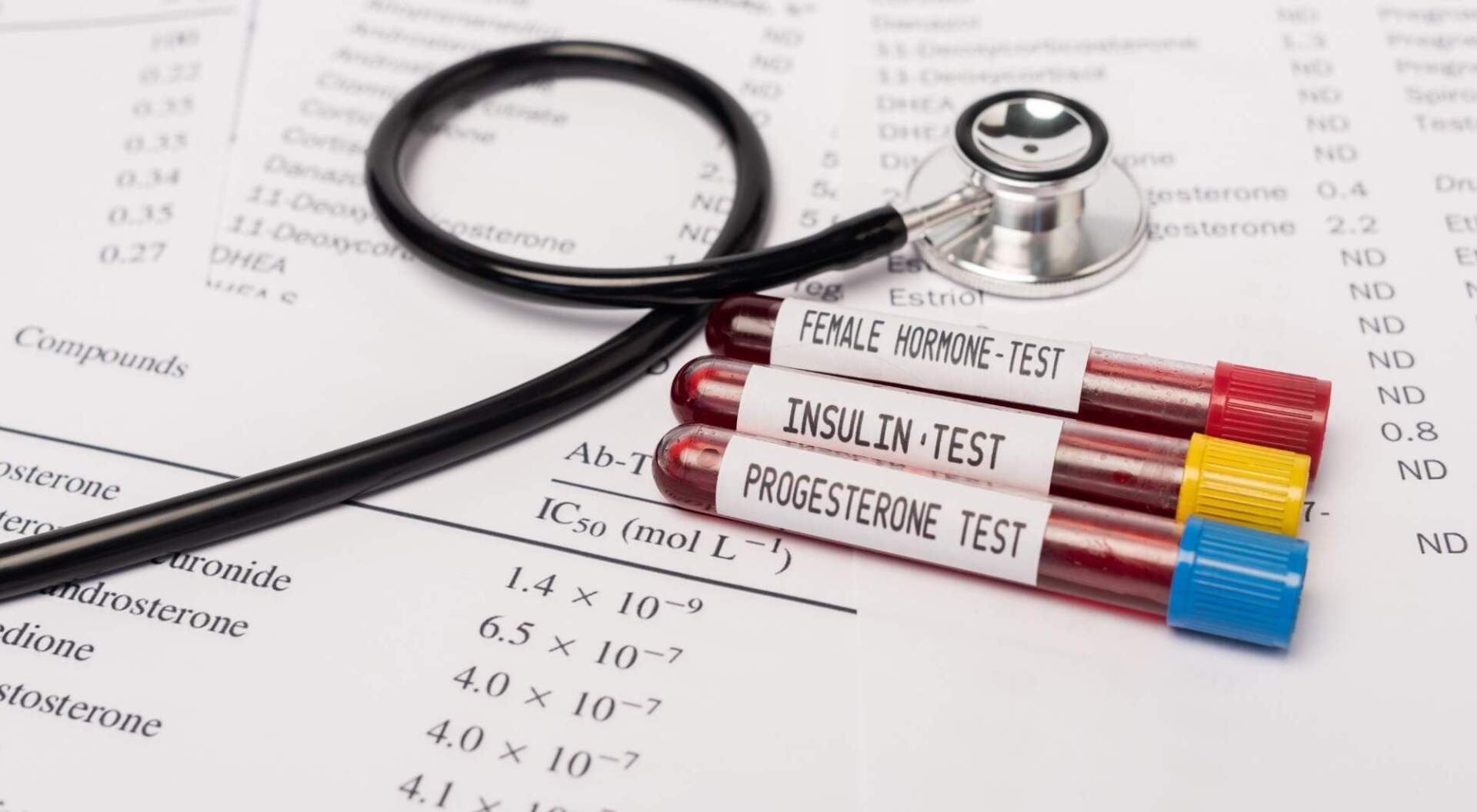Common Signs of and How to Test for Hormone Imbalance
"The content below is not intended to be a substitute for professional medical advice, diagnosis, or treatment. Always seek the advice of your physician or other qualified health provider with any questions you may have regarding a medical condition."
Are you suffering from painful periods, weight gain, or unusual hair growth?
Is it a struggle to drag yourself out of bed each morning?
Maybe your friends have dropped some less than subtle hints about your mood, and
you’re wondering if your hormones may be to blame.
Help is on the way.
If you’re concerned that your hormones may be out of whack, read on.
This guide will cover everything you need to know about the symptoms and how to test for hormone imbalances.
Table of Contents
What Is a Hormone Imbalance?
Your hormones are your body’s chemical messengers.
For most of us, when we hear the word “hormones,” we think of the reproduction process.
But hormones are fundamental to each and every system throughout your body.
And since hormones are so essential in your body, even a tiny imbalance can cause serious side effects.
Produced by your endocrine system, hormones send messages throughout your body to help regulate body processes such as:
- Hunger
- Blood pressure; and
- Sexual desire
A hormone imbalance occurs when there is either too little or too much of a specific hormone in your bloodstream.
And if your hormones aren’t doing their job, you aren’t going to feel like “you.”
How Do I Know if I Have a Hormonal Imbalance?
Hormonal imbalance can affect both women and men, causing any of the following symptoms:
- Weight gain or unexplained weight loss
- Fatigue
- A hump of fat between the shoulders
- Tender or stiff muscles
- Muscle weakness
- Joint pain, swelling, or stiffness
- Increased or decreased heart rate
Can You Test for Hormone Imbalances?
The short answer is yes.
Your first step in testing for a hormonal imbalance is to make an appointment with your doctor for a physical exam.
At your appointment, be prepared to describe the symptoms you are experiencing, as well as the timeline along which they’ve occurred.
And you will need to bring a list of all ...
- Medications
- Vitamins; and
- Supplements
… you’re currently taking.
How Do You Test For Hormone Imbalance?
When it comes to how to test for hormone imbalance, you have several options to choose from.
Let's take a look at 4 of the most common methods of hormone testing.
Blood Tests
Blood testing for hormonal imbalance may be done through the use of at-home tests or by a physician.
A blood hormone panel can be done on both men and women and will test for a wide variety of hormones including:
- Thyroid
- Estrogen
- Estradiol
- Progesterone
- Pregnenolone
- Testosterone
- Prolactin
- Follicle-stimulating hormone (FSH)
- Luteinizing hormone (LH)
- Human growth hormone (HGH)
- Insulin-like growth factor (IGF-1)
- Sex Hormone-binding globulin (SHBG)
- Parathyroid
- Dehydroepiandrosterone (DHEA)
A female-specific hormone blood test checks hormone levels associated with aging and overall well-being.
For this test, blood will be drawn on specific days of a woman's cycle and tested for a broad variety of hormones.
Urine
As with blood testing, urine hormone testing may also be conducted through a home test or through your physician’s office.
How do you check your hormone balance by using urine?
Urine testing involves collecting multiple samples of urine at different times throughout the day or collecting all of your urine for 24 hours in a specified container.
One of the most popular urine hormone tests is the DUTCH test or Dried Urine Test for Comprehensive Hormones.
DUTCH testing is highly advanced and provides an extensive hormonal profile of sex and adrenal hormones, including:
- Cortisol
- Cortisone
- Estradiol
- Estrone
- Estriol
- Progesterone
- Testosterone
- DHEA and DHEA-S
- Melatonin
Saliva
How do you test for hormone imbalance by using saliva?
It's easy.
For saliva testing, patients are asked to spit into a series of plastic tubes, over the course of one or several days, in order to test hormonal levels of:
- Cortisol
- Estrogen
- Progesterone
- Testosterone
- Melatonin; and
- Dehydroepiandrosterone [DHEA]
Saliva testing is frequently used for determining hormone levels in females nearing or going through menopause.
In this case, pre-menopausal or perimenopausal patients are asked to collect saliva between day 19 and day 21 of their menstrual cycles. The saliva samples must be collected within the first two hours of rising for the day.
Saliva testing may be done at the doctor's office or at home.
Nutrition Response Testing
Nutrition Response Testing is the non-invasive study of how your body's reflexes relate to your overall state of health.
These reflexes are determined by neurological reflexes as well as meridian points.
How do you get your hormone levels checked by Nutrition Response Testing at HealthierU?
It's simple and painless.
Dr. Sergi will do a complete physical analysis by testing your body's neurological reflexes and acupressure points to determine any weaknesses within your body.
Through a nutrition response testing assessment, she will be able to:
- Determine the cause of any hormonal imbalance you may be experiencing; and
- Evaluate the way your body is currently functioning as a response to a hormonal imbalance
Nutrition Response Testing is totally individualized and determines what your body’s specific needs are.
Doctor Sergi will then develop a plan to help your hormones get back into balance.
5 Most Common Hormones Doctors Check When Testing for Hormone Imbalances
Now that we've covered
how to test for hormone imbalance, let's take a look at the symptoms that may be present by an imbalance of the 5 most common hormones tested.
#1: Estrogen
Symptoms of low estrogen in women:
- Painful sex
- Mood swings
- Irregular menstrual periods
- Hot flashes
- Breast tenderness
- Headaches
- Depression
- Difficulty concentrating
Low estrogen may increase the risks of:
- Obesity
- Cardiovascular disease
- Osteoporosis
- Sexual dysfunction, including sexual development
Symptoms of high estrogen in women:
- Tender breasts
- Bloating
- Decreased sex drive
- Fibrocystic breast lumps
- Irregular periods
- PMS
- Mood swings
- Headaches
Officially known as
estrogen dominance, increased levels of estrogen may put an individual at higher risks of blood clots and stroke, as well as increasing the risks of chronic disease, including breast cancer and ovarian cancer.
#2: Progesterone
Symptoms of low progesterone in women:
- Hot flashes
- Low sex drive
- Headaches, including migraines
- Moodiness
- Depression
- Anxiety
- Irregular periods
Low levels of progesterone may indicate ectopic pregnancy and can cause spotting and miscarriage.
Symptoms of high progesterone in women:
- Bloating
- Depression
- Anxiety
- Decreased sex drive
- Fluctuations in weight
#3: Testosterone
Symptoms of high testosterone in women:
- Frontal balding
- Acne
- Enlarged clitoris
- Increase muscle mass
- Deepening of the voice
- Infertility
- Polycystic ovarian syndrome (PCOS)
Symptoms of low testosterone in men:
- Moodiness
- Obesity
- Loss of bone density
- Constant fatigue
- Heart disease
Lower than normal testosterone levels may lead to:
- Depression
- Osteoporosis
- Erectile dysfunction
- Low sex drive
Symptoms of high testosterone in men:
- Excessive body hair
- Overly aggressive
- Engaging in risk-taking behaviors
- Acne
- Headaches
- Liver or heart problems
- High blood pressure
- Abnormally high sex drive
- Erectile dysfunction
- Fatigue
- Hot flashes
- Increased appetite
High levels of cholesterol, in both men and women, may result in:
- Heart attack
- Cardiovascular disease
- Stroke
- Sleep apnea
- Infertility
#4: Thyroid-Stimulating Hormone (TSH)
Symptoms of low TSH levels:
- Weight loss
- Bulging eyes
- Sensitivity to light
- Sleep a problem
- Fatigue
- Irregular menstrual cycles
- Confusion
- Lack of tolerance to heat
Low TSH can lead to hyperthyroidism.
Symptoms of high TSH levels:
- Decreased heart rate
- Fatigue
- Puffiness in the face
- Thinning hair or hair loss
- Dry, brittle hair
- Constipation
- Dry skin
- Intolerance to cold
- Increase appetite
- Changes in weight
High TSH can lead to
hypothyroidism.
#5: Cortisol
Symptoms of low cortisol:
- Low blood pressure
- Weakness
- Extreme fatigue
- Loss of appetite
- Dizziness
- Mental confusion
- Vomiting
- Fever
- Sudden pain in your legs or lower back
Lower than normal levels of cortisol may contribute to a life-threatening condition called Acute Adrenal Crisis, also known as Addison's disease.
Symptoms of high cortisol include:
- Rapid weight gain in the face, chest, and abdomen, contrasted with thin legs and arms
- High blood pressure
- Abnormally round face
- Flushed facial appearance
- Muscle weakness
- Bruises and purple stretch marks on your skin
- Mood swings
- Anxiety
- Depression
Higher than normal levels of cortisol may lead to:
- Cardiovascular disease
- Osteoporosis
- Insulin resistant diabetes
How to Overcome Hormonal Imbalance Naturally
Let's face it.
In today's fast-paced lifestyle, hormonal imbalance is becoming increasingly common.
We’ve covered how to test for hormone imbalance, but what about getting your hormones back in line?
Thankfully, there are plenty of natural options for overcoming a hormone imbalance, including:
- Saying no to sugar and sugary drinks
- Avoiding refined carbs
- Take supplements
- Eating plenty of high-quality protein, such as grass-fed meat
- Engaging in regular exercise
- Learning to manage your stress
- Consuming plenty of healthy fats, like avocados, coconut oil, and olive oil
- Avoiding under-eating and overeating
- Making sleep a priority
- Eating lots of fatty fish, such a salmon, and mackerel
Are You Looking for a Natural Way to Check for a Hormone Imbalance? HealthierU Can Assess your Hormones Through a Nutrition Response Testing Assessment
If you're ready to discover how to test for hormone imbalance naturally, you’ve come to the right place.
At HealthierU we specialize in all things natural.
We utilize a holistic approach to get to the root of your hormonal problems and deal with them in a way that is:
- Safe
- Natural; and
- Effective
Get in touch with us today for your free consultation, and get on the path to a healthier you.






